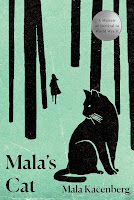Book Review: Mala's Cat: A Memoir of Survival in World War II by Mala Kacenberg
 |
My Rating:
⭐⭐⭐⭐⭐
“We owe it to the dead to keep their memory alive by reminding the world of its responsibility never to forget. For to face the future one has to understand the past.”
In 1939, we meet twelve and a half-year-old Mala Szorer in the Polish village of Tarnogrod where she lives with her family – parents, grandfather and siblings. She is happy and hopeful, attending school and dreaming of finishing her education and joining her eldest sister Balla in Warsaw. WW2, anti-Semitic sentiments and the takeover of their village by the German Army lead to her education being halted, Jews being segregated from the Christian population, and her whole family plunged into poverty. The Nazi occupation of their village brings with it the desecration of synagogues and Jewish cemeteries, forced labor, curfews and mass murders. A series of events results in her having to live in the forests with her cat Malach (Hebrew for Angel). On account of her golden hair and blue eyes, she can move around freely pretending to be a Polish Christian (without the Star of David sewn on her clothes identifying her as a Jew, which was mandatory). After her brother is shot dead by SS soldiers, it becomes her responsibility to find food for her family to keep them alive, forced to depend on the kindness of the people in the villages nearby.
“It soon became apparent to me that there were more bad people in the world than good ones, and I changed from a happy-go-lucky child to a serious one as I began to see things I could never have imagined.”
After her parents are rounded up, deported and ultimately killed, a fate she narrowly escapes, she is left to fend for herself with only Malach by her side. Malach’s instincts and intervention save her from imminent danger on more than one occasion. In the course of her time in the forests and nearby villages, while evading being identified and captured, she meets partisans who are determined to kill as many Nazis as they can before being caught and killed, kind families who take her in and Nazi sympathizers who would not hesitate to turn her in for a kilogram of sugar (the reward offered by the Nazis). Unsure of whom to trust, she has to rely on her own intelligence, instincts and sheer determination to survive. While she feels for and shows compassion for fellow Jews she meets on her way , she also does not fail to realize that she must fend for herself which would often call for more practical behavior and thereby the need to harden her heart.
“Hunted like a young animal separated from its flock, I felt desolate and in need of sharing my sufferings with another human being. Desperate, I began to confide in Malach more and more. I hoped that she would continue to be at my side at all times. But I needn’t have worried, for she did not look as if she was about to abandon me just yet.”
Eventually, she travels to the Labour Exchange in Biłgoraj where she assumes the identity of a Polish Christian Girl Stefania Iwkiewicz and leaves for Germany (per orders by Germans for Polish workers to report and be assigned to work in Germany). In 1942, Mala reaches Germany and is employed by the Pearlmutters who own and operate a hotel and restaurant. In Nazi Germany, she works hard, keeps her head down and lives in constant fear of being discovered. Malach is her only true companion, who she believes is truly an angel. Her story continues through the end of the War and her migration to England in 1945 and the events leading up to her marriage –the people she meets, the places she travels, the obstacles in her path and how she overcomes them. The author shares how she survived the last few years of the war, picking up the pieces to start a new life after so much hurt and loss.
'Mala's Cat: A Memoir of Survival in World War II' by Mala Kacenberg is a moving story of strength, resilience and of course, survival. Mala’s bond with Malach will touch your heart and make you believe that true to her name Malach was an Angel looking out for Mala through the most difficult phase in her life. Stories revolving around the Holocaust are never easy to read. Mala’s story gives us a glimpse of the struggles faced by Jews who spent years evading capture and deportation to the Nazi concentration camps. The author’s tone is matter-of-fact and direct, at times almost detached which makes it even more compelling. While it may seem that the narrative lacks emotion, it should be remembered that this is a first-hand account of events in the author’s life and not a work of fiction and this is the way the author has chosen to share it. I have nothing but respect and admiration for the brave young girl who survived all she went through and chose to tell us her story. This is an important book - one that should be read, appreciated and remembered.
“Why was I made fearless? Why was I given such a lot of courage and the strength to withstand all the suffering? Why had I survived? But others had survived and experienced miracles. Anyone who survived the Holocaust survived with miracles. Perhaps one day I would read about them and find an answer.”
Comments
Post a Comment